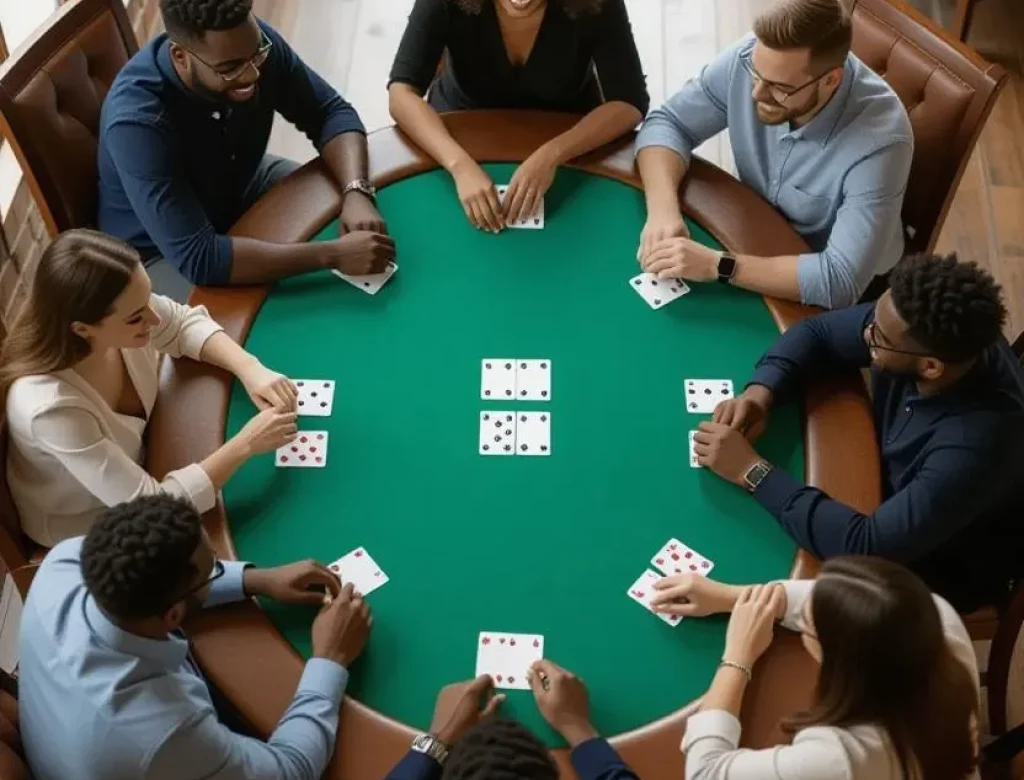
When you think of poker, images of high-stakes games, serious faces, and the thrill of competition likely come to mind. But poker isn’t just a game of chance or a pastime for casinos; it’s also a surprising ally for your mental health and overall well-being. Far from being a simple card game, poker offers a blend of cognitive challenges, social engagement, and psychological rewards that can lead to significant health benefits.
Let’s dive into how poker boosts your brainpower and helps relieve stress. You’ll also discover why so many modern players choose it as their favorite hobby, especially in the digital age of gaming.
Table of Contents
ToggleSharpening Cognitive Skills
Poker is often referred to as the ultimate mind sport, and for good reason. Every decision you make at the table involves critical thinking, pattern recognition, and problem-solving. These mental exercises aren’t just fun, they keep your brain sharp and healthy.
A. Enhancing Strategic Thinking
In poker, every move counts. You’re constantly analyzing your hand, predicting opponents’ moves, and planning your strategy. This type of strategic thinking can enhance decision-making skills in everyday life, from financial planning to conflict resolution.
B. Boosting Memory and Concentration
Poker requires players to remember the cards dealt, track betting patterns, and recall previous hands. This regular memory workout helps improve both short-term and long-term memory. Moreover, staying focused during extended poker sessions can enhance your ability to concentrate in other areas of life.
C. Encouraging Math and Probability Skills
Every hand of poker involves probabilities, whether you’re calculating the odds of drawing the card you need or figuring out if a bet is worth the risk. By engaging with these calculations, players naturally strengthen their numerical and logical reasoning abilities.
Stress Relief Through Social Interaction
Poker is more than a solitary mental exercise, it’s also a deeply social game. Whether you’re playing at a live table or chatting with friends online, poker offers opportunities for meaningful connections and camaraderie.
A. Building Bonds with Others
Playing poker with friends or joining a poker community can foster strong relationships. The shared experiences at the table, victories, losses, and light-hearted banter, create a sense of belonging that’s essential for emotional well-being.
B. A Distraction from Everyday Worries
Immersing yourself in a poker game provides a welcome break from life’s stresses. The focus required for poker shifts your mind away from daily anxieties and helps you recharge mentally. For some, challenges like the micro-stakes bankroll challenge bring just the right amount of excitement and focus.
C. Encouraging Emotional Regulation
Poker teaches players to manage emotions like frustration, excitement, and disappointment. Learning to stay calm under pressure at the table can translate into better emotional control in real-life situations.
Managing Anxiety and Building Resilience
A. Facing and Embracing Uncertainty
Poker mirrors life in its unpredictability. You can’t control the cards you’re dealt, but you can control how you play them. Learning to make the best of uncertain situations in poker can help reduce anxiety about the unknown in other areas of life.
B. Developing a Growth Mindset
In poker, losses are inevitable. However, every loss is a learning opportunity. Adopting this mindset of continual improvement fosters resilience, helping players handle setbacks with grace and perseverance.
Poker as a Mindfulness Practice
A. Focusing on the Present
When you’re engaged in a poker game, your focus is entirely on the cards, the bets, and your opponents’ actions. This intense concentration can provide a meditative experience, helping to clear your mind of external distractions.
B. Cultivating Patience
Poker requires patience as you wait for the right cards or the perfect moment to strike. Developing patience at the table can carry over into other aspects of life, making you more tolerant and composed.
Brain Health and Longevity
A. Reducing the Risk of Cognitive Decline
Engaging in complex mental activities, such as poker, has been associated with a lower risk of dementia and Alzheimer’s disease. Regularly challenging your brain keeps it active and resilient as you age.
B. Promoting Neuroplasticity
Poker encourages neuroplasticity, the brain’s ability to adapt and form new connections. This is especially important for older adults looking to maintain cognitive function.
Poker as a Holistic Approach to Well-Being
A. Building Confidence
Winning a hand through strategic thinking or a well-executed bluff can boost self-esteem. Poker helps players trust their instincts and decisions, translating to greater confidence in real-world situations.
B. Providing a Sense of Achievement
Whether it’s mastering a new strategy or winning a tournament, the milestones achieved in poker provide a satisfying sense of accomplishment.
Tips for Enjoying Poker Responsibly
- Set Limits: Play within your means, both financially and time-wise.
- Focus on Fun: Remember, poker is a game. Prioritize enjoyment over winning.
- Balance Your Activities: Combine poker with other hobbies and physical exercise for a well-rounded lifestyle.
More Than Just a Game
Poker is far more than a pastime or a gamble, it’s a tool for mental growth, emotional regulation, and social connection. From sharpening cognitive skills to providing stress relief, poker offers a unique blend of challenges and rewards that benefit your overall health. So, next time you sit down at the table, know that you’re not just playing a game, you’re investing in your brain and well-being.
Why not give poker a try? You might discover a new passion that boosts your health while bringing joy and excitement to your life. For more guides and strategies, visit Bluffing Monkeys.
